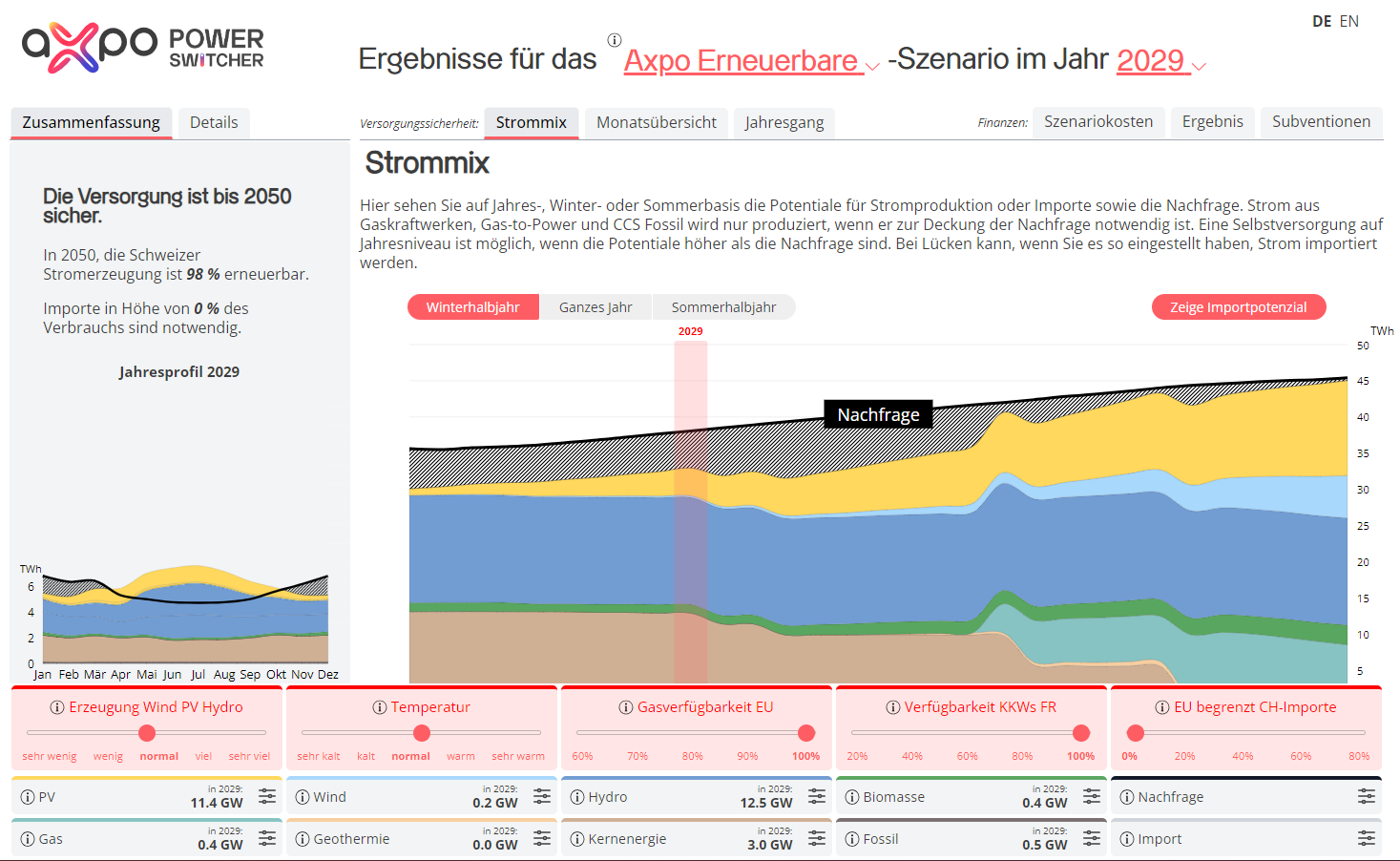21.01.2025 | Progress, challenges, and insights behind our latest Sustainability Report
Behind the Scenes of the Sustainability Report
About a month ago, Axpo published its latest sustainability report. Under new legal requirements, the Board of Directors approved the report for the first time. This marks another milestone in our commitment to a sustainable future. Presented in a fresh design, it provides concrete facts and answers to questions about sustainability and climate protection.
Martin Pranjic from Axpo Group Sustainability was responsible for producing the report. In this interview, he talks about the importance of sustainability reporting, the progress made in sustainability and the challenges facing Axpo.
What progress has Axpo made in the area of sustainability over the past fiscal year?
Progress has been made in various areas. We connected over 300 MW of renewable capacity to the grid and successfully expanded the business with green technologies like biomethane.
Additionally, the proportion of women in the workforce has continued to rise and now stands at nearly a quarter of our employees. We’ve also increased the number of apprentices and are on track to reach our goal of 600 apprentices by 2030. Furthermore, we’ve made progress in electrifying our vehicle fleet: by 2030, the entire fleet should be electric.
Why are these advancements important?
Our initiatives in areas such as renewable energy and diversity and inclusion not only contribute to societal progress but also strengthen us as a company. Studies such as McKinsey's Diversity Wins [1] show that diversity increases a company's ability to innovate and improves its long-term competitiveness. At the same time, we're making an active contribution to mitigating climate change and building a sustainable foundation for the future. Comprehensive and meaningful sustainability reporting plays a key role in transparently presenting and driving these developments.
Why is sustainability reporting becoming increasingly important?
Sustainability or ESG (Environment, Social, Governance) reporting provides a transparent presentation of a company's non-financial performance in areas such as the environment, social issues and responsible behaviour, thereby completing the overall picture. It’s about showing the impact business activities have on the environment, how employees are supported, and what measures are being taken to ensure ethical business practices.
It's not just about transparency; it's also about providing a basis for analysis and continuous improvement. With increasing requirements from regulations such as the EU's Corporate Sustainability Reporting Directive (CSRD), the importance of reporting is growing - both for us as a company and for our stakeholders.
So, is a sustainability report aimed at various target groups?
Yes, such a report provides insights for many audiences – analysts, investors, current and potential employees, customers, media, and NGOs. It enables all of them to get a comprehensive picture of our activities and their relation to areas like climate, employees, or sustainability in the supply chain.
It’s also important to understand that sustainability reports can build trust in companies. A study by EY [2] shows that 88% of investors increasingly use sustainability-related information to make investment decisions. At the same time, 93% of respondents expect companies to provide verifiable evidence of their sustainability activities – including audited reports.
For Axpo, reporting is becoming increasingly strategic. On the one hand, it provides important data and insights for decision-making. On the other, it’s a tool to build trust with our stakeholders.
How much work is involved in producing a sustainability report?
It’s a major undertaking. Over several months, more than 100 people from across the organization collaborated. This starts with collecting and reviewing content and data and ends with a thorough review by various departments and committees, as well as external auditing – this year, for the first time, by KPMG.
A report like this certainly isn't without its challenges - what were the biggest?
(laughs) Of course, there were challenges! Many moving parts need to work together when preparing a sustainability report. Several factors came into play with the latest report: for the first time, we used custom-designed digital tools to move away from the many Excel sheets we had previously relied on. And the first-time use of a new tool always comes with uncertainties. Ultimately, however, everything went smoothly, and we’ve built a solid database to rely on in the future.
Another challenge every year is the time pressure: within just two months after the fiscal year-end, the report must be completed, reviewed, and published in two languages.
The external audit by KPMG also brought new requirements, especially regarding internal data flows. Additionally, for the first time, the report had to be approved by the Board of Directors due to new legal regulations.
And as if that weren’t enough, we also introduced a revised layout, adding another layer of complexity.
Why was the layout of the sustainability report redesigned?
We wanted to elevate the report not only in terms of content but also visually. The new layout ensures the information is more clearly structured, presented more attractively, and easier to digest. It helps highlight key points and makes the reading experience more enjoyable. At the same time, it was important for us to give the report a more professional appearance.
Ultimately, Axpo wants the report to not only be read but also spark curiosity and provide insights into previously unknown aspects. Ideally, it leaves a lasting impression. So far, the new layout has been well received.
What’s next? Can you give us an outlook on the increasing demands from regulations?
The requirements for sustainability reporting are continuing to rise. Particularly relevant for us is the transition to the new EU reporting standard under the CSRD – not least because of our subsidiaries and branches within the EU. It redefines the transparency requirements for companies like Axpo. At the latest, the report for the 2025/26 fiscal year will need to comply with the CSRD standards. This means we will have to report even more comprehensively and in greater detail.
The requirements for climate reporting are also growing: in addition to emissions within Axpo’s sphere of influence (Scopes 1 and 2), we will increasingly need to provide data on Scope 3 emissions across the entire value chain. This means more data, more transparency – but also more responsibility.
In parallel, we’re implementing the EU taxonomy together with Group Controlling, which provides a framework for universally classifying “green” or “sustainable” economic activities within the EU. All these regulatory developments present new challenges but also open opportunities to strategically advance our long-term sustainability goals. It’s an exciting time!
What are Axpo's long-term sustainability goals?
Our net-zero ambition goes beyond legal requirements. By 2040, Axpo aims to reduce all emissions within its sphere of influence to net zero (Scopes 1 and 2). However, by 2030, both our electricity consumption and vehicle fleet should already be emission-free.
A key focus is on the expansion of renewable energies, the decarbonisation of electricity consumption and the promotion of innovative technologies. Axpo takes responsibility and is ready to meet the challenges of our time.
For you personally: What makes sustainability reporting so important?
For me, transparency, gaining insights, and building trust are central. However, the role of Corporate Sustainability goes far beyond reporting – we are a centre of expertise with increasing strategic and creative responsibility. Sustainability is not a short-term project, but a long-term commitment that requires innovation, collaboration and accountability – from all of us.
Sustainability is the compass guiding our corporate management to enable long-term success and value creation. It has a long tradition at Axpo and will continue to shape our future path.
We enable a sustainable future through innovative energy solutions.
Learn more about Axpo’s commitment and our steps forward. The full 2023/24 Sustainability Report is available under Report & Guidelines.




.jpg)





